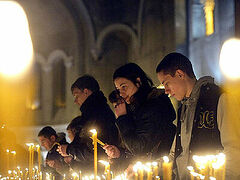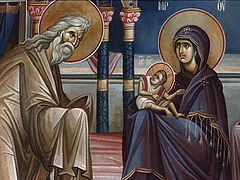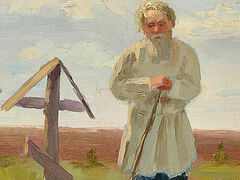Now we must learn to live and distinguish between what is important and what is secondary. Now the difference between the mortal and the immortal, the corruptible and the incorruptible has become full-blown.
Property, habits and the way of life—all of this is gone. The naked truth remains: We are mortal, but we really want to live. I recall a famous phrase of the writer Mikhail Bulgakov, a native of Kiev: “True, we are mortal, but that is half the trouble. The bad news is that sometimes we die suddenly.” During war this “sometimes” becomes a rule and awakens sleeping Christians: “I must always have the memory of death...” Like thunder, the words of the Scriptures come back to our memory: Remember the end, and thou shalt never do amiss (Sir. 7:36).
All ascetics speak with one voice about the memory of death. But it is not a fatal task, and there is no black hopelessness here. This remembrance is permeated with faith in the Kingdom of God and a reward in the afterlife. This remembrance is permeated with the task of making efforts to ascend to Heaven. Thanks to it everything that hinders eternal life and our salvation will be cut off daily. Thanks to it we can build Christian relationships with the world, people, and God.
The remembrance of death is given by God. It is a great gift. St. John Climacus says: “Just as bread is vital for physical life, so the remembrance of death is vital for spiritual life.”
The advantages of remembrance of death are manifested in at least three points: It encourages us to perform spiritual labors and make daily efforts; it helps us endure problems and hardships peacefully; and it affirms us in prayer.
This remembrance forbids the spirit to relax, the body to be lazy and the mind to fall asleep. However, it should not go beyond an unnatural framework. A fruitful and proper remebrance of death, according to St. John Climacus, is manifested through impartiality to every creature, abandonment of your will, and accepting God’s will.
One New Martyr was awaiting death by firing squad in a punishment cell. Every day for several days in a row he read to himself the Canon for the Departure of the Soul. He prepared for death and accepted the will of God. But rumors suddenly appeared about the re-examination of the case and his pardon. Here, too, he had to obey God’s will. He later wrote: “I didn’t tempt God, and I stopped reading the Canon for the Departure of the Soul.”
In order to live we must remember for Whom we live and Who controls our lives. In Biblical language it is expressed by the words “to walk before the face of God”, to be with God, to praise Him with every breath, as King David said: Let every thing that hath breath praise the Lord (Ps. 150:6). In order to achieve this it is necessary, in the words of the Liturgy of John Chrysostom, “to commit ourselves and one another, and our whole life to Christ our God.” We must set the mind and exercise the will in goodness, the heart in holy feelings and the body in ascetic practices.
The mind should never be lazy and without work. It must be occupied.
St. John of Sinai advises good exercises for this: “There are many activities for an active mind. Meditation on the love of God, on the remembrance of God, on the remembrance of the Kingdom, on the remembrance of the zeal of the holy martyrs, on the remembrance of God Himself present, according to him who said, I saw the Lord before me (Ps. 15:8), on remembrance of the holy and spiritual powers, on remembrance of one’s departure, judgment, punishment and sentence.”1
So, we should teach the mind to love God, remember God and His omnipresence, the Kingdom of Heaven and death, realize the zeal of the martyrs, remember the Angels, the departure of the soul from the body, torture, torment and eternal condemnation. These things keep you from falling. And they attune the soul, like a musical instrument, to serving God.
The Ladder of Divine Ascent tells us the story of a negligent monk who died and then was brought back to life. For the remaining twelve years of his life he did not utter a word, closed his cell and “shed warm tears.” The memory of death leads to the fear of God. It is a gift from God, a virtue, the rejection of worldly comforts for the sake of Heavenly comfort. According to St. John Climacus: “He who has mortified himself for everything in the world truly remembers death, and he who still has some attachment cannot exercise the meditation of death freely.”
Prayer is as necessary for such spiritual work as is air. Especially when death is hovering over you and when, like a condemned person, you do not know the “number of your days.” Holy Hieromartyr Michael Cheltsov, in his “Memoirs of a Man Sentenced to Death, about His Experience”, relates his experience of the nearness of death: “Only during prayer—and even then not immediately—did I forget myself a little. It was sad, a heavy weight in the heart, dark and bleak, and a state of involuntary melancholy, which cannot be expressed in words or fit into any specific concepts or formulas. As I stood up to pray, I felt as if some unknown force were pushing me away from it and I was awfully disinclined to pray; I was pronouncing the words, but the same painful question remained in my mind, and there was no peace in my heart. I was reading, without understanding; I reread the same words of prayer two and three times, and only by forcing myself like that did I finally free myself from my tormentor; my soul became quiet, contented, and I finished my prayer calmed, and perhaps even joyful, seeming to have found a favorable answer to my question and ready even now to go to death. Only prison made it possible to feel and experience true pleasure, calmness and joy in prayer and from prayer.”
In the face of executioners, when the back of the head was chilled by the muzzle of a gun, we see many New Martyrs kneeling with their hands raised to Heaven. Holy Hieromartyr Bishop Ambrose (Gudko) of Sarapul was on his knees with his hands raised to heaven, praying to God while they were digging a shallow hole for him. Death, according to the New Martyrs, is passing into eternity. But already during our lifetime we commune with this eternity in prayer. Hence the labor of prayer—the opportunity to know the incorruptible life, while still living in a corruptible body.
We who live in the world and worry about the lives of our loved ones and our own people, must have at least the rudiments of such a prayer with the memory of death. It will reassure us, give us hope and teach us to commend our lives into the hands of God. Those who have wisdom will understand that the remembrance of death is a huge incentive to live on.
Holy Hieromartyr Anatoly Zhurakovsky, who while still young was famed throughout Kiev, wrote that Christ gives us not only life, but life in abundance (cf. Jn. 10:10).
We should keep in mind the principle of being: “Whatever does not grow, dies.”2 The remembrance of death helps us precisely in growth. It helps us keep the heart going in the direction of Heaven, encourages the body in pain and ascetic labors, comforts the restless spirit, and gives the mind the motivation to seek those things which are above…, set your affection on things above (Col. 3:1–2).




